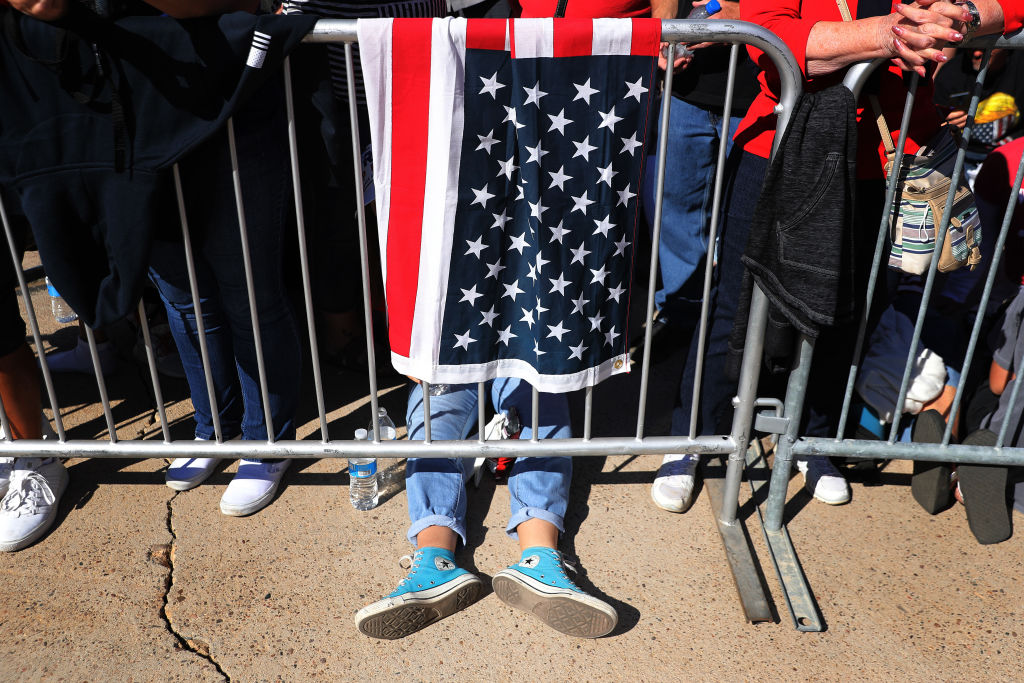In Trump time, it feels like a lifetime since the president shut down the government because it wouldn’t fund the border wall he once said Mexico would pay for.
That was nearly a year ago, but to Oyawele “Oya” Dumas, it could have been yesterday. That’s because she is still recovering from 35 days of reduced earnings, which marred her credit, forced her to hustle for other jobs and plagued her with insomnia.
Dumas operates a small home-based child care provider in Detroit. During the shutdown, two of the four parents who patronize her center lost their jobs; one was a federal employee. Dumas also permanently missed out on the federal subsidy, which her low-income clients normally use to pay for child care, while the federal government was closed.
Oya Dumas works in an underpaid profession and has no financial cushion – which she tries to remedy for herself and others with activism.
Since January, Dumas has gone to work as a nanny, sold herbal teas and worked as a “sitter” in a hospital, looking after mentally ill patients at night. This cascade of setbacks has put a strain on her and on her 11-year-old son.
“I had a couple of breakdowns. I’m actually just now coming to be in the state of being okay,” says Dumas, adding that she is two months behind on her bills.
Sitting in a Starbucks, Dumas has an infectious smile and, when she speaks, tends to hold four fingers of one hand in the palm of the other.
Not all of Dumas’ financial situation can be blamed on the shutdown. She works in an underpaid profession and has no financial cushion, which have causes that stretch back further. She tries to remedy the situation for herself and others with activism.
About a year and a half ago, she joined a group called Mothering Justice that is working to expand the rights and well-being of women and families, particularly women of color who are often “last in line” to get rights or help, as Dumas points out. She has marched. She has attended meetings.
Banks have regained profitability since the Great Recession, but Detroit has moved from being a majority homeowner city to being one that is majority renter.
“I go to all the events I can go to,” Dumas says. She has gone to Michigan’s capital, Lansing, to talk to lawmakers about Mothering Justice’s support for child care funding and for a ballot initiative to require paid sick time to help low-income families like the ones she serves. (The Republican legislature avoided a vote on that initiative by adopting the measure last year and then weakening it.)
What’s difficult, Dumas says to me later on the phone, is not blaming herself for her situation: “People really make you feel bad for asking for help—or for needing help.” Like most child care workers, she relies on public assistance.
* * *
This self-blame is what Danielle Atkinson, Mothering Justice’s founding director, calls the “internalized racism” that her organization seeks to combat, alongside “systemic racism” in the form of, for example, redlining and a racially discriminatory criminal justice system.
Add in the lingering effects of the housing crisis: The banks have regained profitability, but many low income borrowers have not been made whole. These include Dumas’ mother, who saw her home “stripped away” during the Great Recession, according to Dumas.
Dumas has seen women with no history of mental illness pushed to the verge of suicide due to severe depression brought on by financial stress.
Since the 2008 housing crisis, Detroit has moved from being a majority homeowner city to being one that is majority renter. Indeed, the city’s much-touted economic recovery—after its emergence from bankruptcy in 2014—has bypassed many of the city’s neighborhoods.
“A lot of families are stressed out and don’t know how they’re going to make it day to day, and whether they’re going to have shelter,” says Dumas.
Almost 38 percent of Detroit’s residents and nearly 55 percent of the city’s children live in poverty, according to the most recent numbers from the U.S. Census Bureau.
Dumas has seen women with no history of mental illness pushed to the verge of suicide due to severe depression brought on by financial stress. She has set to work “pulling [them] up by the bootstraps” and “loving on them,” she says.
“You might be the only hope for people,” says Dumas. That kind of mutual support is as important as the policy work that Mothering Justice does, says Atkinson.
“There’s a lot of pumping up of our moms because the world is set up to take that away from them,” she says.
* * *
In spite of her day-to-day struggles, Dumas remains irrepressibly engaged. She voted for Obama twice, for Bernie Sanders in the 2016 primary and for Hillary Clinton in that year’s general election. She still has not made up her mind as to whom she will support in 2020.
But women like Dumas could be influential next year. It’s not just that African-American women constitute the most loyal block of Democratic voters, with 94 percent voting for Hillary Clinton in 2016. Mothering Justice plans to magnify their members’ sway. Each one is being asked to identify 50 friends and family in her “electoral universe” who may need an extra push, according to Atkinson. They will start nudging them in January. The organization is also planning an endorsement process that not only looks at issues, but also at candidates’ staffing plans, indicating an understanding of a political axiom, “Personnel is policy.”
Dumas is skeptical that elected officials will fight on her behalf once they get in office. But her doubts will not keep her from the polls. Dumas lives in a state that Hillary Clinton lost by fewer than 11,000 votes. She knows her vote and that of her neighbors could make all the difference in November.
“I hope it’s a better turnout,” says Dumas, looking ahead to 2020. “It needs to be.”
Illustration by: Design Urban
Copyright Capital & Main





